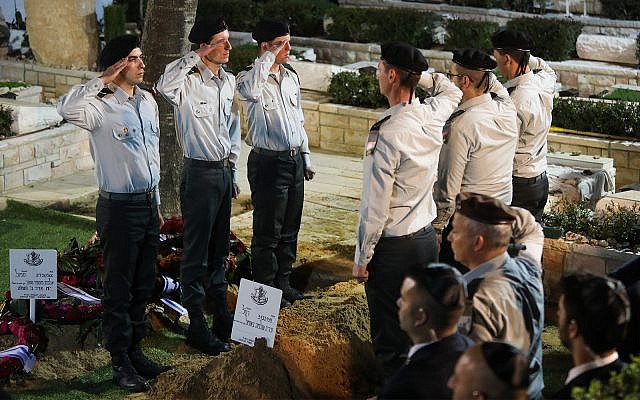Thousands accompany US-born serviceman, killed in 1982 war, to final resting place; Rivlin, Netanyahu, IDF chief eulogize him; PM hails Russian role in return of remains
Sgt. First Class Zachary Baumel was laid to rest in Jerusalem’s Mount Herzl military cemetery on Thursday evening, nearly 37 years after his death in the First Lebanon War’s battle of Sultan Yacoub in 1982, at the age of 21.
Thousands turned out for the ceremony, where Baumel — whose remains were returned to Israel days ago after a complex IDF intelligence operation and with central Russian assistance — was eulogized by President Reuven Rivlin and Prime Minister Benjamin Netanyahu, among others.
Also attending were Baumel’s family, friends, IDF Chief of Staff Aviv Kohavi, former chief of staff Gabi Ashkenazi, Culture Minister Miri Regev and top officials from the IDF’s armored corps, Baumel’s unit.
“Zachary, after 37 years, a few days before the battle where you fell, you wrote to your parents, ‘Don’t worry, everything’s alright, but it looks like I won’t be home soon,’” Rivlin said in his eulogy. “Thirty-seven years have elapsed, but today you returned home. You returned to our homeland, to Jerusalem.”
“We did not give up and we will not give up on this sacred task until all those who fell defending our people and country are brought home. We will not cease until all our boys are back home, including your comrades in arms Sergeant First Class Yehuda Katz and Sergeant First Class Tzvi Feldman, and all those who fell in battle and whose resting place is unknown,” Rivlin said.
Netanyahu said that retrieving the bodies of Israel Defense Forces soldiers killed in battle touches the deepest part of Israeli and Jewish identity.
Like many Israelis, he said, “I got chills when I heard that Zachary was back home. We’ve been waiting for this for 37 years.”
“Bringing our sons back home touches the deepest part of our identity as Jews and Israelis,” Netanyahu said. “In the name of these values, and out of love for Israel, Zachary went to war.”
Osna Haberman, Baumel’s sister said: “All of our prayers during these 37 years went to one place and we’re here. I thought about what I would do here in this place. I can’t even embrace you. So I thought to turn to the ground and ask the land to embrace you. After a few minutes I understood that I don’t even need to ask.”
“The land embraces you so strongly. And why? Because there is absolute love between the son that gave everything for the land and the land itself, and there is a perfect union here. You are together now,” Haberman said.
In his remarks, Netanyahu said that he had personally asked Russian President Vladimir Putin for his help finding the remains of Israeli soldiers missing in Syria two years ago.
Netanyahu attended the funeral shortly after returning to Israel from Moscow.
“When I asked him to help us bring our boys home, he immediately instructed his people to begin,” Netanyahu said of Putin. “I have followed the search personally, and the IDF has been in contact with the Russian military about it.”
Netanyahu held a press conference Thursday in Moscow with Russian President Vladimir Putin at which the latter said his country’s military, with Syrian assistance, had retrieved the remains. “I want to thank you, my friend, for what you have done,” Netanyahu told Putin in Moscow.
A senior diplomatic official, who asked not to be named, said the operation was evidence of the “special” connection between Jerusalem and Moscow, and that Russia’s help would not have a “diplomatic price tag” linked to the situation in Syria.
The decision to release the information about the operation to the media will not impede the search for the remaining two soldiers, the official said.
“This was an operation by Russia and the Russian army at our request,” the official continued. “The prime minister met Putin some two years ago and raised the issue of Sultan Yacoub. We gathered intelligence, asked them to focus on it and Putin agreed to do it.”
The Russian president confirmed that the effort to find the remains “was difficult for the special forces.” In September, the Russian defense ministry said one of its soldiers had been injured in the operation.
After a complex and secret operation, Baumel’s remains were returned to Israel on an El Al plane, a military spokesman said on Wednesday. The announcement brought to a close a decades-long mission by Baumel’s Jerusalem-based, American-born parents to find their son, which included international pressure campaigns and faint hopes that he may have been captured alive during the brutal Sultan Yacoub tank battle.
Yona Baumel, Zachary’s father, died 10 years ago; his mother Miriam is in her 80s.
Netanyahu told a press conference earlier Wednesday that Baumel’s remains were recovered along with his tzitzit, or ritual fringes, and tank jumpsuit.
In 2016, an Israeli tank lost in the battle was returned to Israel by Russia.
Tank commander Baumel, a Brooklyn-born American immigrant, was one of three Israeli soldiers whose bodies were never recovered following the battle of Sultan Yacoub, a skirmish between the IDF and Syrian army in Lebanon’s Bekaa Valley, in which 21 Israeli servicemen were killed and more than 30 were injured.
Though Baumel and the other two soldiers — Zvi Feldman and Yehuda Katz — were generally believed to have been killed in the battle, there has also been speculation and reports that they were captured by the Syrian military in Sultan Yacoub and brought to Damascus.
The remains of Feldman and Katz were not recovered in Operation Bittersweet Song, though Israeli officials initially thought Feldman’s body might have been among the other remains recovered in the operation, according to the Haaretz newspaper.
The announcement regarding Baumel was delayed until officials could rule out that possibility, Haaretz said.
Source: The Times of Israel
